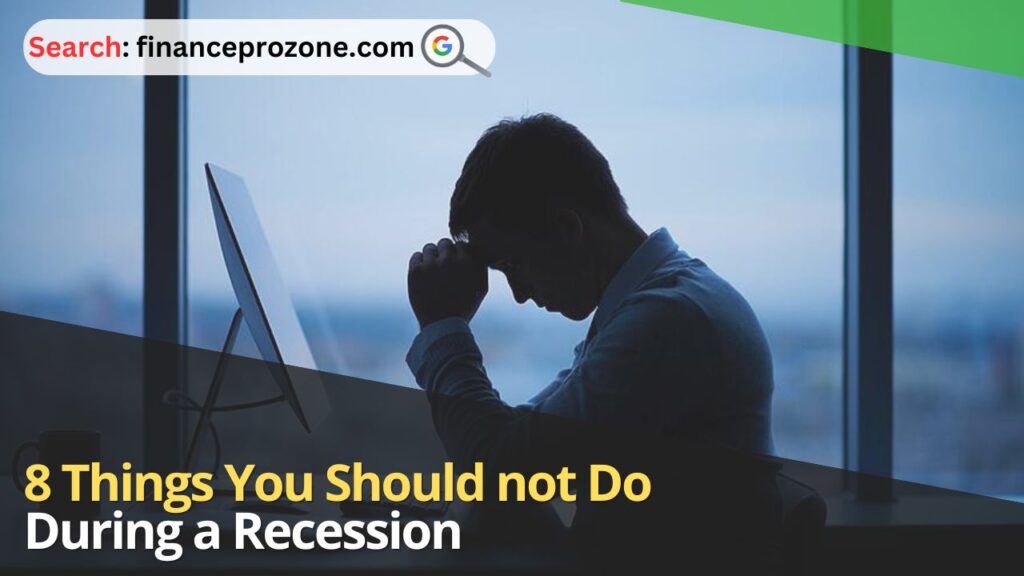8 Things You Should not Do During a Recession: Recessions are economic downturns that impact individuals and businesses alike. While it is impossible to avoid a recession entirely, how you respond can make a significant difference in your financial stability and future. Here are ten things you shouldn’t do during a recession to ensure you navigate through challenging economic times more effectively.

8 Things You Should not Do During a Recession
1. Panic Selling Investments
One of the most common mistakes during a recession is panic selling investments. When the stock market declines, it can be tempting to sell off assets to prevent further losses. However, this reaction often results in locking in losses and missing out on potential market recoveries. History has shown that markets tend to rebound over time, so it’s essential to maintain a long-term perspective and avoid making hasty decisions based on short-term market fluctuations.
2. Ignoring a Budget
During a recession, it’s crucial to have a clear understanding of your finances. Ignoring a budget can lead to overspending and financial strain. Create or revise your budget to account for any changes in income or expenses. Prioritize essential expenses like housing, utilities, groceries, and healthcare, and look for areas where you can cut back on non-essential spending. A well-maintained budget helps you stay on top of your financial situation and avoid unnecessary debt.
3. Accumulating Unnecessary Debt
Taking on new debt during a recession can be risky. High-interest credit card debt or large loans can become burdensome if your income is affected. Instead, focus on paying down existing debts and avoid making significant purchases that require financing. If you must take on debt, look for low-interest options and ensure you have a clear plan for repayment.
4. Neglecting an Emergency Fund
An emergency fund is a critical safety net during economic uncertainty. If you don’t already have one, start building it as soon as possible. Ideally, an emergency fund should cover three to six months’ worth of living expenses. This fund can help you manage unexpected expenses or loss of income without resorting to high-interest loans or credit cards. During a recession, prioritize saving a portion of your income to build or maintain this fund.
5. Making Major Lifestyle Changes
Recessions are not the best time to make significant lifestyle changes that increase your financial commitments. For example, buying a new house, starting a business, or taking an expensive vacation can put additional strain on your finances. Consider postponing major decisions and focus on stability and security. If lifestyle changes are necessary, plan carefully and ensure they are within your financial means.
6. Overlooking Job Security
Job security can be uncertain during a recession, as companies may downsize or implement hiring freezes. Avoid complacency in your current position by continuing to demonstrate your value to your employer. Stay updated with industry trends, enhance your skills, and consider additional training or certifications that can make you more indispensable. Networking and maintaining a strong professional presence can also help you stay connected to potential job opportunities.
7. Disregarding Health and Wellness
Financial stress during a recession can take a toll on your physical and mental health. Neglecting your health can lead to increased medical expenses and decreased productivity. Prioritize regular exercise, a balanced diet, and sufficient sleep to maintain your well-being. Mental health is equally important; practice stress management techniques such as meditation, mindfulness, or speaking with a therapist if needed. Investing in your health helps you stay resilient and better equipped to handle financial challenges.
8. Ignoring Opportunities for Additional Income
While reducing expenses is crucial, finding ways to increase your income can also be beneficial during a recession. Look for side gigs, freelance work, or part-time jobs that can supplement your primary income. Utilize your skills and hobbies to generate extra cash. Additionally, consider passive income streams, such as renting out a room or investing in dividend-paying stocks. Diversifying your income sources can provide a financial cushion and reduce dependency on a single source of income.
Conclusion: 8 Things You Should not Do During a Recession
Navigating a recession requires careful planning, discipline, and a proactive approach to managing finances. By avoiding these ten common mistakes, you can better protect your financial well-being and emerge from an economic downturn in a stronger position. Stay informed, remain adaptable, and focus on maintaining stability to weather the challenges of a recession effectively.
I hope this article on 8 Things You Should not Do During a Recession has been helpful. If you have any further questions, please feel free to leave a comment below.
Video

